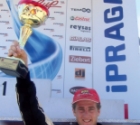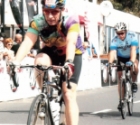-1366874103.jpg)
And that’s not all . . . the Achva Haifa Football Club chairman is also a Manchester United fan, as LYDIA AISENBERG discovered
Issa Huri is the longest serving football club chairman in Israel, and yet he hasn’t physically watched a match for years.
“I just get too excited and it’s not good for my health — but I certainly make sure everything is as it should be for the players before they go on the pitch, then I go to sit in my office and get a report of the game over my mobile phone,” says Issa, a Christian Arab who lives, works and breathes football in the mixed Jewish-Arab city of Haifa.
For more than 50 years, Issa Huri has been the central personality behind the Achva Haifa Football Club, starting off as a player in the youth team and then, when only 19 years old, bringing the club back to life when the original Christian Arab owners closed it in the 1950s.
“It was shut down for a number of reasons, one of which was racism in the league,” reminisces the now 74-year-old. The present rampant racism found in the football stands of Israel and Europe is a bitter disappointment to a man who has spent most of his life trying to stamp out hatred and hooliganism through the game of football.
Sitting behind a large wooden desk, surrounded by shelves and walls full of trophies, pennants, newspaper cuttings and photographs — including one of President Shimon Peres and other well-known Israeli leaders — Issa spills over with enthusiasm when talking about Achva Haifa Football Club and the various coexistence projects with which he is involved.
I had traveled to Haifa that morning to meet up with a group of British Jewish community leaders and educators on a four-day study tour of the mixed Jewish-Arab cities under the auspices of the U.K. Task Force. The day was due to start at the Beit Hagefen Jewish-Arab Center in Wadi Nis Nas, in downtown Haifa.
Arriving early and looking for a bathroom, I bumped into Issa Huri — dressed in a Manchester United shirt and tracksuit — on a stairwell, and he pointed me in the right direction for the ladies' room on the next floor up.
Curiosity got the better of me, and I returned shortly afterward to see who the spritely gentleman in the Man U. outfit was. He showed me into his office tucked away in the basement of Beit Hagefen. From what I have since learned one can find him there from early morning until late in the evening most days of the week. He is a living legend, not only in Haifa but in the Israeli world of football altogether, having been presented with many a prestigious award from official and other sport and social activist organizations over the years.
Apart from being a dedicated fan and official of Achva Haifa, Issa Huri has been a supporter of Manchester United since he was a teenager — hence the shirt and tracksuit. When I mentioned that many years ago I had lived for a few years in Manchester and had watched George Best and other famous players at that time strut their stuff at Old Trafford, Issa smiled broadly and demanded to know more — not that I could remember that much, mind you. After all it was the 1960s.
For decades Issa Huri has used his love of football and the Achva Club to gather up youth at risk from the Wadi Nis Nas neighborhood, and his ability to be capable of getting things done where others have failed has earned him the nickname of "the Bulldozer".
“Right from the beginning the intention was that Achva [brotherhood] would be a team that would exemplify unity between Jews, Christians, Muslims, Druze and Bedouin,” he explained.
When he began his almost impossible mission, Issa gathered youngsters together to play on a piece of waste ground in the neighborhood, and when a team was formed, transported them to away-games in the back of a truck.
“When we would eventually get where we were going I would open the back doors and the players would spill out drenched in perspiration looking like they had already played the match,” he recalls.
Home games were played on the football pitch of an Arab village outside the city and at times, when Issa’s vehicle was not roadworthy, he and the players walked over the mountains to get to the game.
Indeed, the story of Issa and his decades of dedication to the game and to the players, in addition to his contribution to building positive relationships between residents of his city, could fill a book or two.
Beit Hagefen, where Issa Huri’s basement office can be found, is a center where people from all walks of life and diverse religious backgrounds in Haifa can be found engaged in social and cultural activities.
Built in the late 19th century along the path connecting the lower part of the city to Mount Carmel, the stone building boasts attractive arched windows, large balconies and architectural gables and works of art created for the Wadi Nis Nas Holiday of Holidays Festival adorn the building. The festival, an annual event held in November and December, attracts huge numbers of people from all over Israel who come together for cultural events, street performances and art exhibitions in celebration of the holidays of the three major religious groups — Chanukah, Christmas and the Muslims’ Eid al-Adha.
In 1910 the building became the Herzliya Hotel, but in 1915 it was impounded in order to house officers of the Turkish-German headquarters. During the British Mandate, and even for a number of years following the establishment of the State of Israel, the building was used as an elementary school. However, in 1963 it was converted, with the encouragement of the Jewish mayor Abba Khoushy, into the Jewish-Arab Center, with the objective of fostering tolerance and coexistence in Haifa.
The efforts of Beit Hagefen and individuals such as Issa Huri to encourage the city’s diverse population to live together peacefully, has put the people and the city at the top of the Israeli "shared citizenship" league.
 ESRAmagazine Photo Contest: terms and conditions
ESRAmagazine Photo Contest: terms and conditions Advertisers List
Advertisers List-1366906022.jpg) Mayor at tree planting
Mayor at tree planting A Matter of Perspective
A Matter of Perspective A fantastic motor sport adventure – a dream come true
A fantastic motor sport adventure – a dream come true my sporting year 2007
my sporting year 2007 Lydia Aisenberg
Lydia Aisenberg